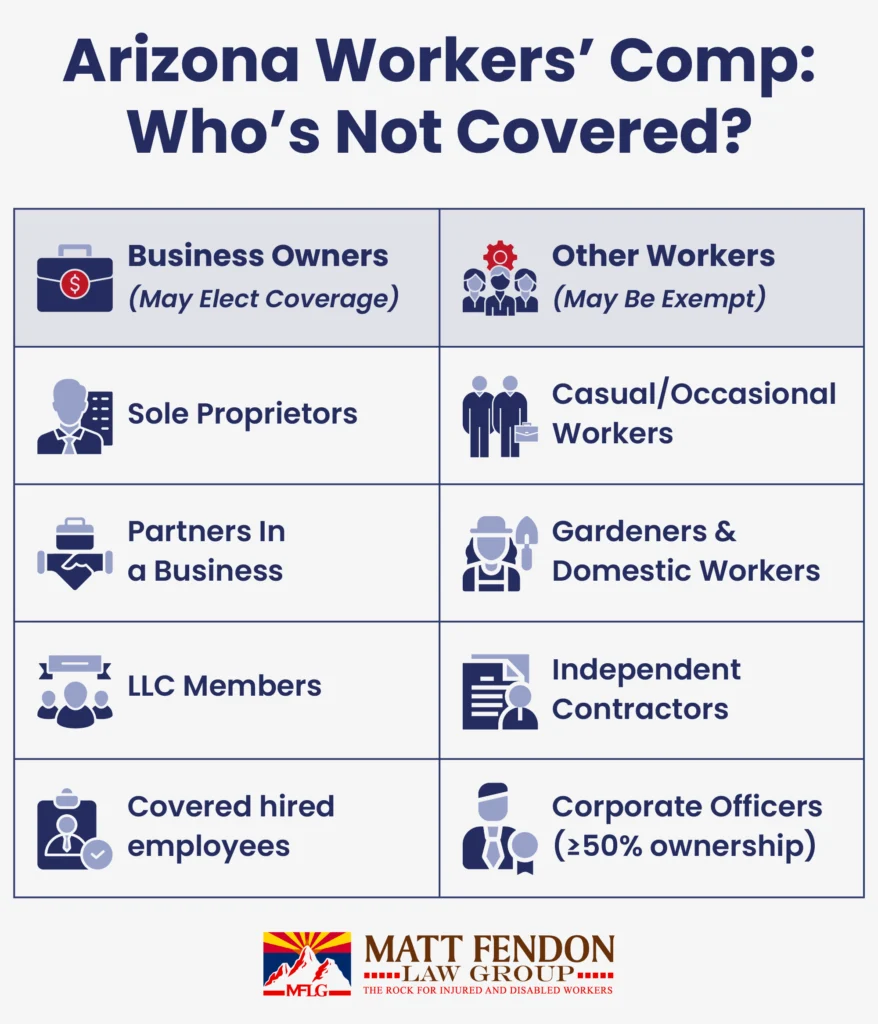Generally, Arizona law requires businesses that have at least one employee to carry workers’ compensation insurance through their business insurance policies. But some exceptions exist to this general rule. In this post, we identify the kinds of workers who are exempt from workers’ compensation in Arizona.
To learn more about whether you are covered by your employer’s workers’ comp insurance, or if you need to begin a claim for workers’ compensation benefits after a workplace injury or other work-related illness or medical condition, Matt Fendon Law Group can help. Call us at (800) 229-3880 to speak with an Arizona workers’ comp specialist or contact us online.
What is the General Rule for Workers’ Coverage Under Workers’ Comp?
Workers’ compensation covers most full-time and part-time employees for employers who are required under Arizona state law to carry a policy of workers’ compensation insurance. For covered employees, workers’ compensation coverage begins as soon as their employment begins.
You may qualify for benefits—including partial lost-wage compensation—if a covered employee’s work-related injury or illness connects to their employment, even if it occurred off-premises.
Benefits that covered employees may receive through workers’ compensation claims include:
- Payment for medical expenses to treat injuries
- Travel expenses related to medical treatment (if traveling more than 25 miles one-way)
- Vocational rehabilitation costs (not mandatory)
- Temporary partial disability benefits
- Temporary total disability benefits
- Permanent partial disability benefits
- Permanent total disability benefits
- Death benefits
Who is Exempt from Workers’ Compensation?
Arizona workers’ compensation law recognizes the following business owners as being potentially exempt from workers’ compensation coverage:
- Sole proprietors
- Partners in a partnership
- Members of a limited liability company
Let’s take a closer look at each of these categories.

Sole Proprietor Exemption
A sole proprietor is a person who is in business but is not engaged in it as a legal entity like a partnership, corporation, or limited liability company (LLC). Sole proprietors often run businesses without employees.
If you are a sole proprietor, you are exempt from the need to purchase a policy from a workers’ compensation insurance carrier, although you do have the option to apply for a workers’ compensation policy. However, if you hire one or more employees, you will need to have workers’ compensation coverage for them.
Partner Exemption
A partnership is a business entity owned by two or more partners. Similar to the owner of a sole proprietorship, partners are exempt from the requirement to carry workers’ compensation on themselves, but they can choose to be covered.
Also, like with a sole proprietorship, employees of a partnership business must be covered by workers’ compensation.
LLC Member Exemption
An LLC is a business entity that is owned by members. In some ways, it is like a corporation in that it offers members some legal protection from being sued directly.
Working LLC members with ≥50% ownership are automatically excluded from workers’ comp coverage. But members can use a certificate of election to be covered by an insurance carrier if they do so in writing. LLC employees are required to be covered by workers’ compensation.
Working LLC members with <50% ownership are considered employees by ARS 23-901.
An employee can rescind this declination of coverage before any incident occurs that would trigger a claim for benefits under the workers’ compensation insurance policy.
Other Kinds of Workers’ Comp Exemptions
The three exemptions above relate to owners of businesses. Several other kinds of exemptions exist for certain kinds of workers. These include:
- Casual employees not in the usual course of the employer’s trade or business
- Domestic workers employed in someone’s home
- Independent contractors
- Working shareholders who have at least 50% ownership
Does Arizona Workers’ Compensation Apply to You?
This article is intended to provide a general overview of who can be exempt from workers’ compensation insurance coverage in Arizona.
Some questions can require careful analysis of the details of your work relationship, like whether you can be considered an employee or an independent contractor based on your job. Just because your employer is calling/categorizing you as an independent contractor does not mean you are one.
If you need workers’ comp benefits but have had your workers’ comp claim denied based on your employer’s determination that you are subject to a workers’ compensation exemption, talk with an experienced Arizona workers’ compensation attorney at Matt Fendon Law Group.
You can call us at (800) 229-3880 or use our contact form to schedule a free consultation with a workers’ compensation lawyer.
